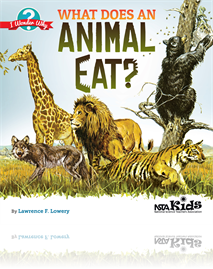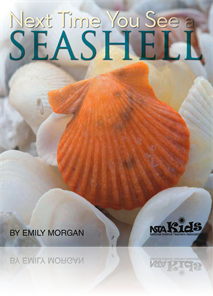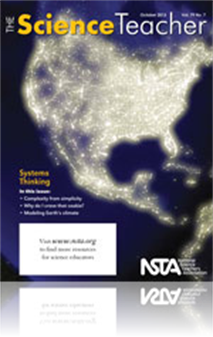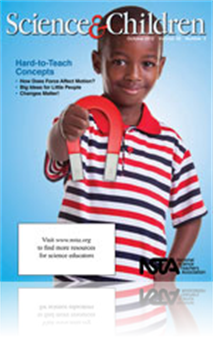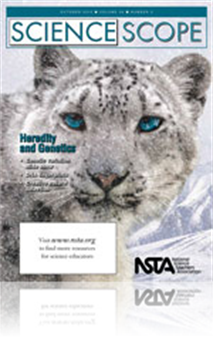All Resources
NSTA Press Book
What Does an Animal Eat?: I Wonder Why
Kids who want to know all about animals will find this book fascinating. What Does an Animal Eat? offers insights into two special aspects of hungry animals: how their teeth and beaks offer clues to what they eat and the food chain’s role in helpin...
By Lawrence F. Lowery
eBook
Next Time You See a Seashell (e-book)
This book tells the amazing story behind seashells: how they are made by mollusks, used for protection and camouflage, and full of clues about all they’ve been through. Inspired by Next Time You See a Seashell, young readers will find these intrica...
Book Chapter
Seashells are some of the most beautiful objects found in nature. Have you ever wondered where they come from? ...
NSTA Press Book
The NSTA Ready-Reference Guide to Safer Science, Volume 3
"The changing safety legal standards and professional best practices affecting academic laboratories are efforts to match the rise of modern science's discoveries and applications. Unfortunately, teacher preservice preparation and inservice professio...
By Kenneth Russell Roy
Journal Article
One effective way to teach connections among body systems is using a problem-based approach. The authors developed an activity to help students understand the relationships of various body systems in the common event of eating a cookie....
Journal Article
How to form a study group to examine the Next Generation Science Standards, second public draft....
Journal Article
May the Magnetic Force Be With You
This article provides a series of developmentally appropriate experiences and discussions that concretely scaffold students between grades 2–4 toward accurate ideas of magnetism....
Journal Article
How to form a study group to examine the Next Generation Science Standards, second public draft....
Journal Article
The Green Room: Nonnative, Invasive, Exotic, Oh My!
This column focuses on making your teaching more environmentally friendly. This month’s issue talks about invasive species....
Journal Article
Science 101: Does Technology Evolve?
This column provides background science information for elementary teachers. This month’s issue examines the evolution of technological products....
Journal Article
Scientific Discoveries the Year I Was Born
In this learning activity, students research what significant scientific advances happened in the year of their birth and present them to the class. The activity promotes writing, helps students enhance their scientific literacy, and also improves th...
Journal Article
Idea Bank: Engaging Students in Classifying Matter
The Idea Bank provides tips and techniques for creative teaching, in about 1,000 words. This month’s Idea Bank provides an activity that engages students while teaching them physical and chemical properties and changes....
Journal Article
The Early Years: Shining Light on Misconceptions
This column discusses resources and science topics related to students in grades preK to 2. This month’s issue discusses investigations of light....
Journal Article
How to form a study group to examine the Next Generation Science Standards, second public draft....
Journal Article
Health Wise: Flu Season: The Best Defense
This column provides up-to-date information on current health topics—along with classroom activities that help students make healthy choices. This month’s issue discusses an activity that shows how flu germs spread....
Journal Article
Scope on the Skies: Apparent Sizes, or "It was this big!"
This column focuses on astronomy throughout the year. This month’s issue discusses specific astronomic events that were highly publicized....
Journal Article
A guided inquiry helps students view an equilibrium system from the particulate level....
Journal Article
This column shares interviews with professionals using science in the workplace. This month’s issue describes the life of an inventor....
Journal Article
The authors review DNA fingerprinting and describe two standards-based lessons they have used in middle school science classes to provide a hands-on approach to learning the basic idea of how restriction enzymes work, the fundamentals of gel electrop...
Journal Article
The Evolution Readiness project introduces fourth-grade students to a series of big ideas that would lead them to understand the theory of evolution by natural selection. The goal in developing this project was to cover the fundamental concepts that ...
Journal Article
Science Shorts: Modeling Light and Shadows
This column provides classic classroom activities that emphasize science process skills. This month’s issue describes a 5E lesson in which students study light and shadows through a broad range of verbal, numerical, and symbolic models....
Journal Article
This column shares tips for teachers just beginning their career. This month’s issue is Part 1 of two columns dealing with classroom management....
Journal Article
Formative Assessment Probes: Talking About Shadows
This column focuses on promoting learning through assessment. This month’s issue highlights shadow investigations that provide an ideal context for children to collect and analyze data used to recognize and explain predictable patterns of the Sun's...
Journal Article
By playing into students' inquisitive nature and taking a closer look into the details of science content, teachers can start uncovering student misconceptions, correcting them, and even preventing future misconceptions from developing....



